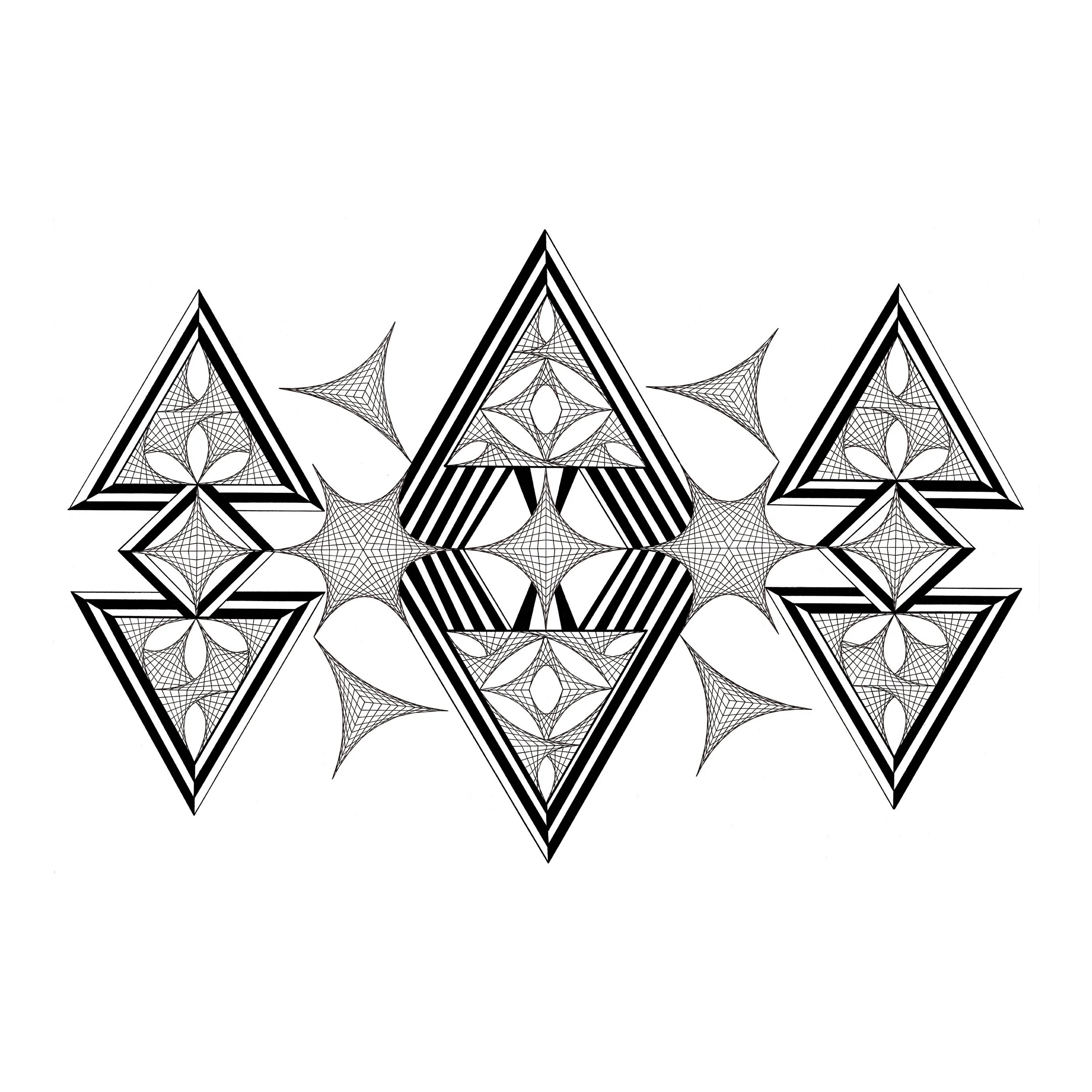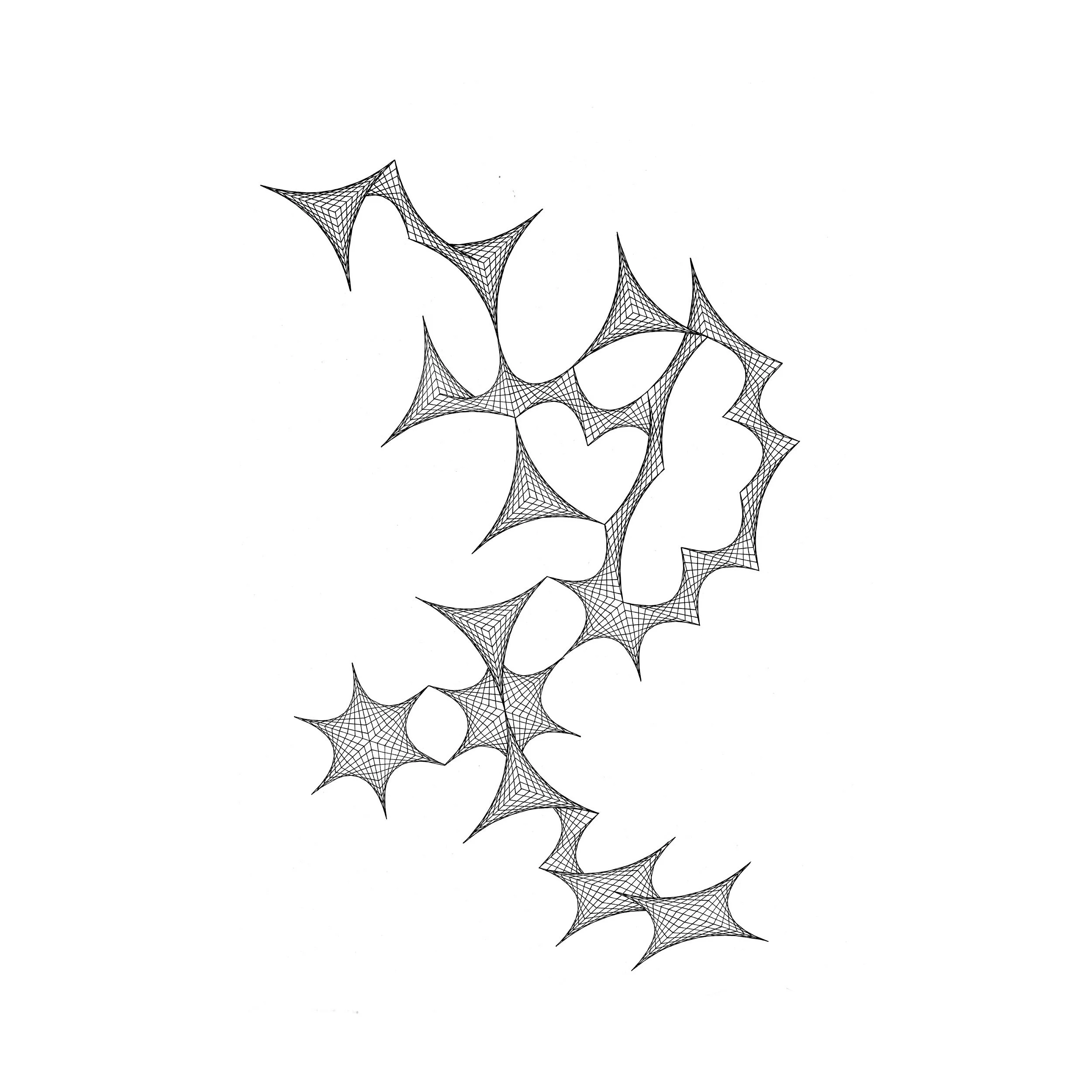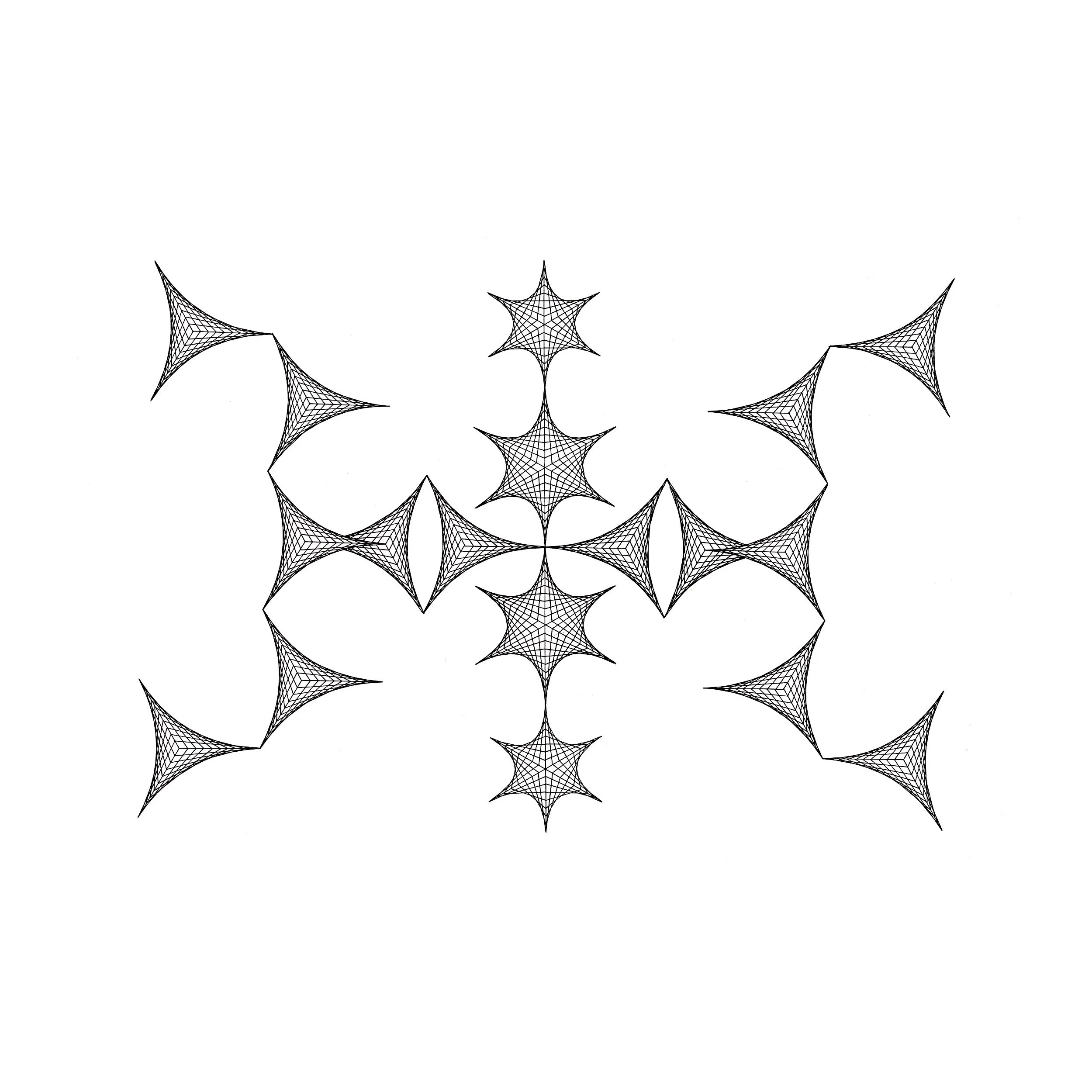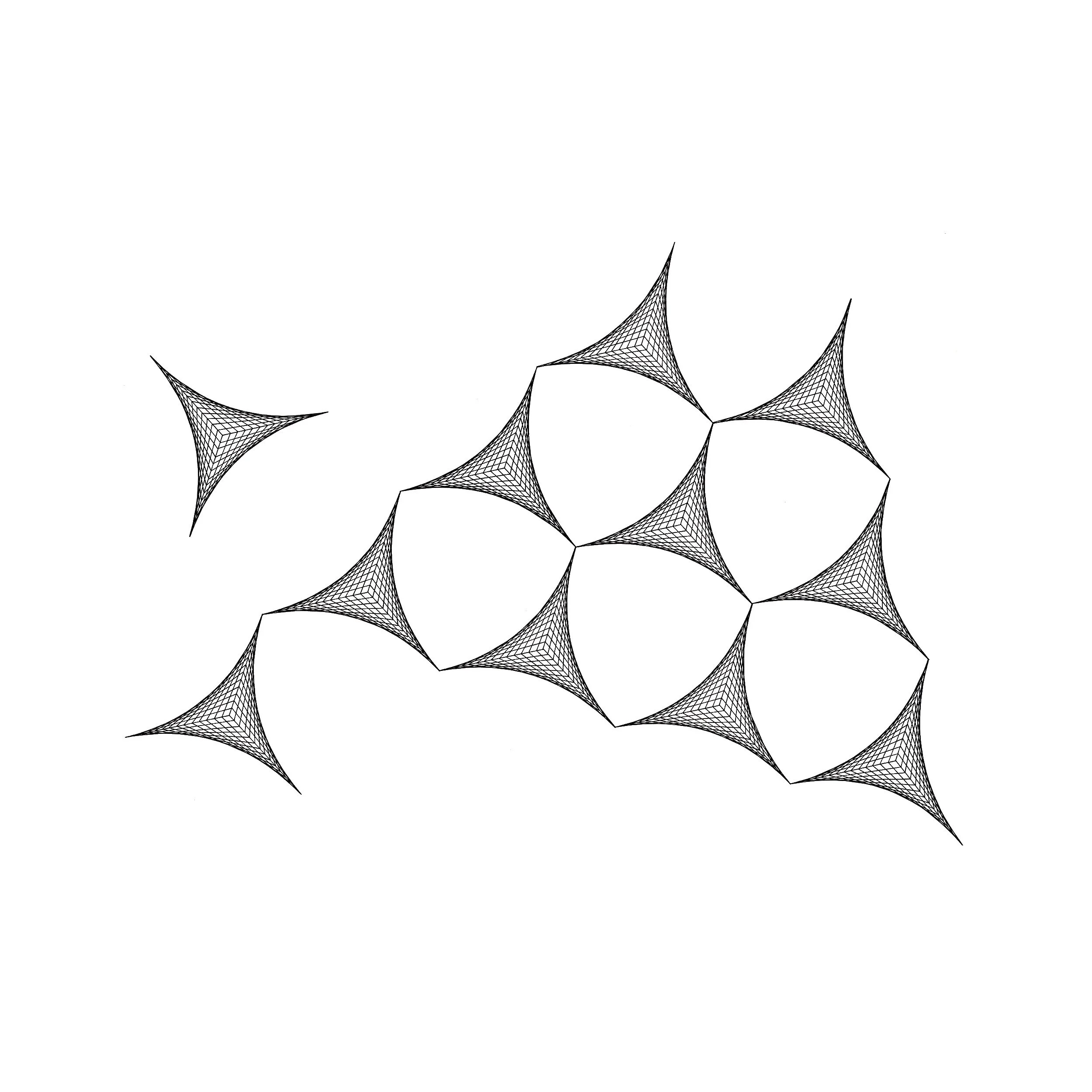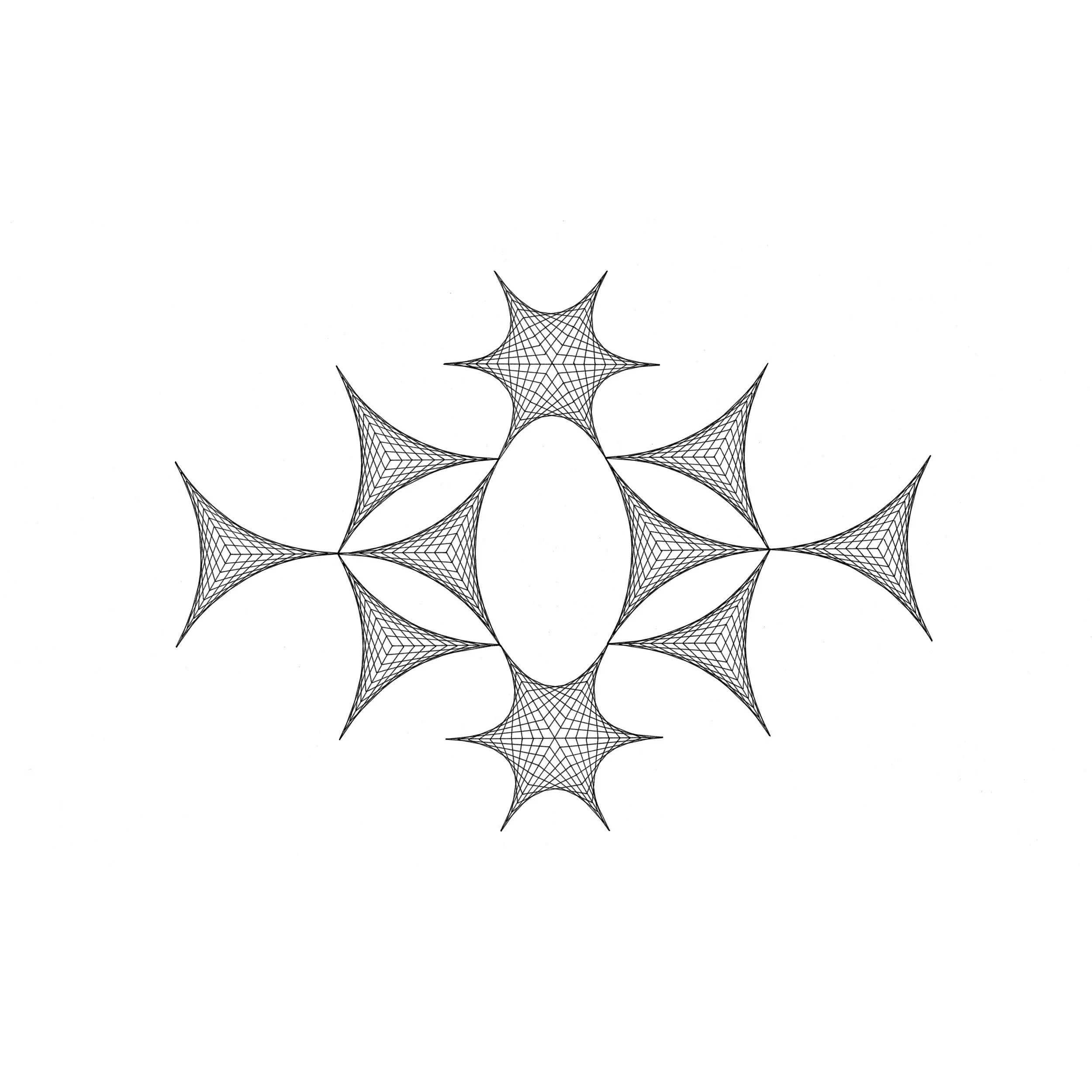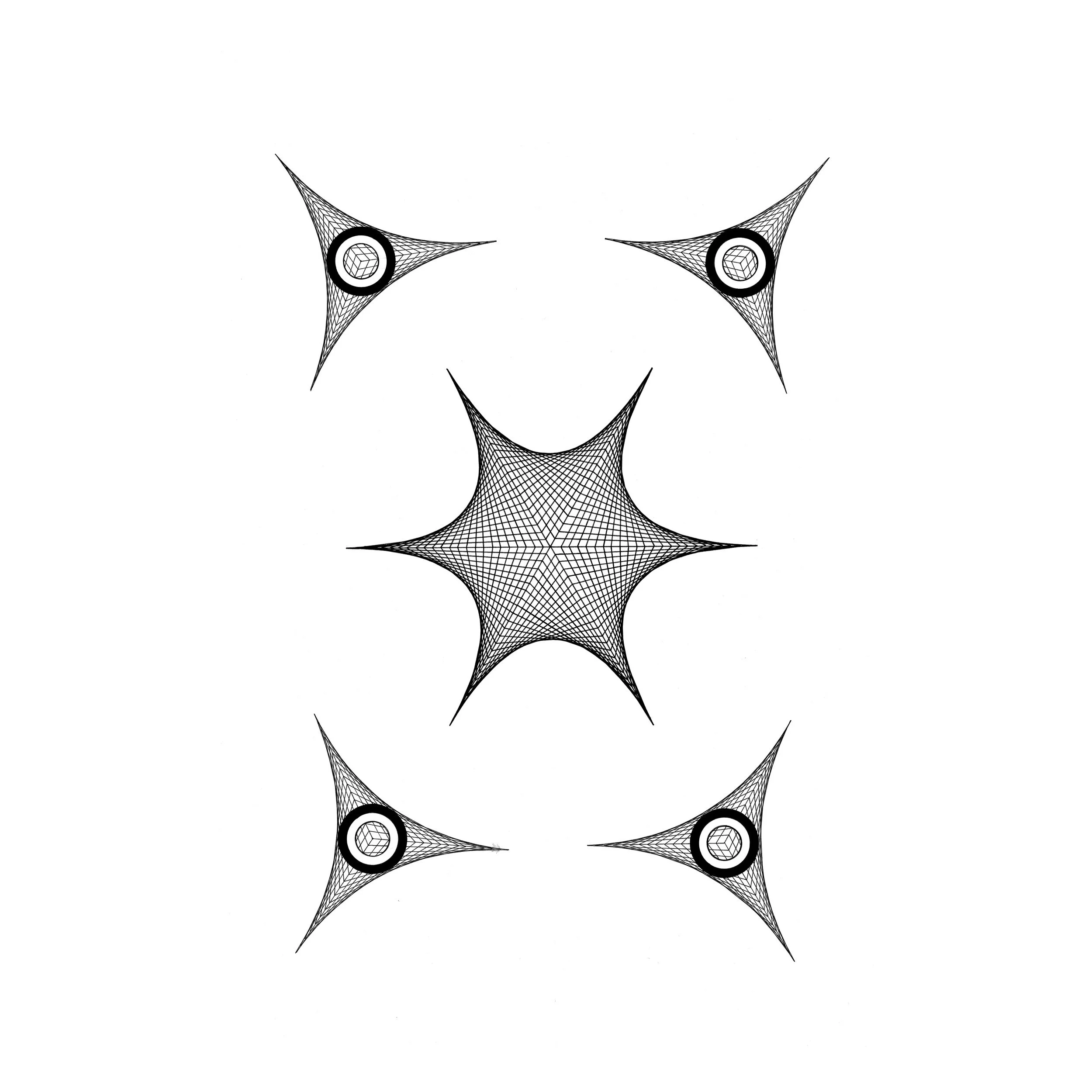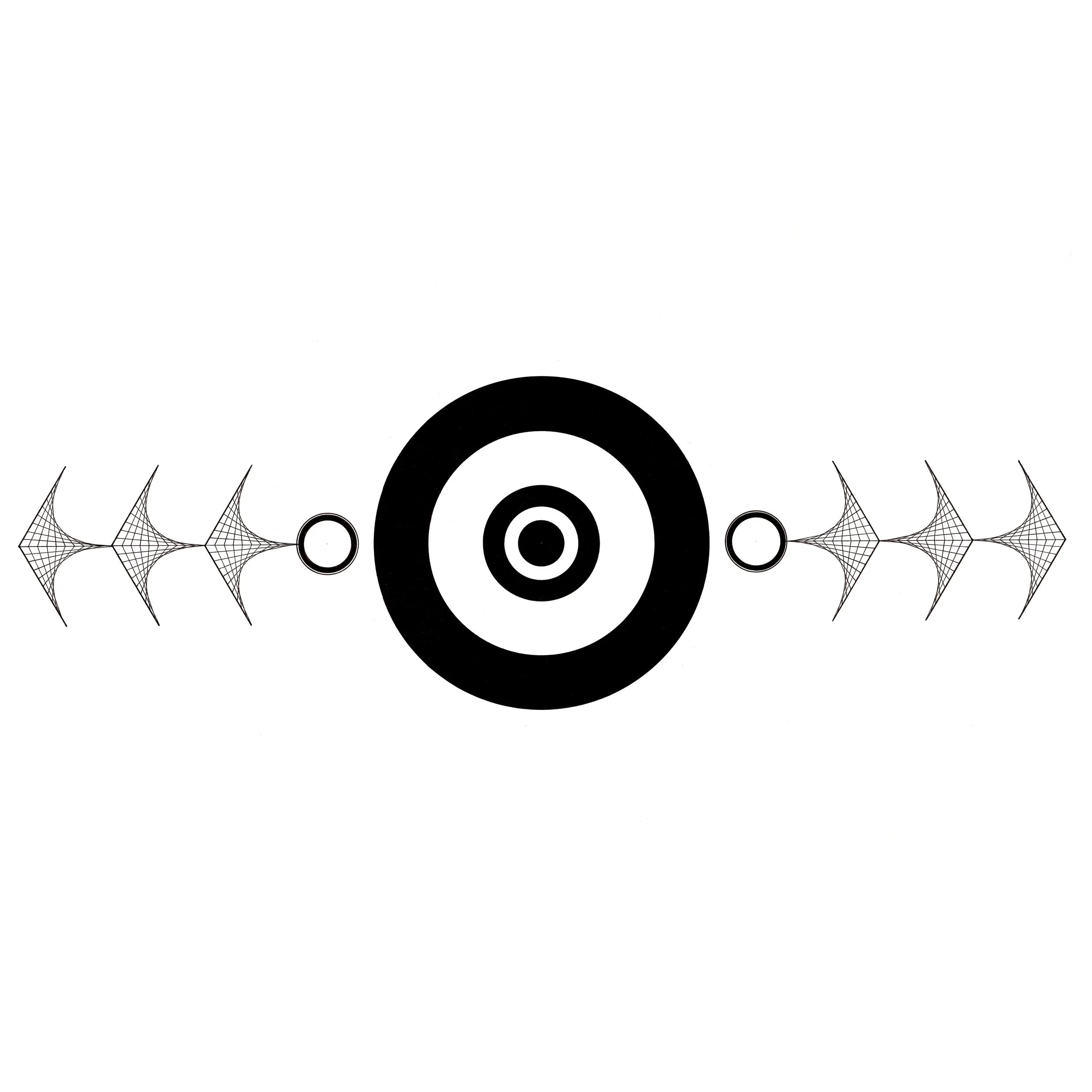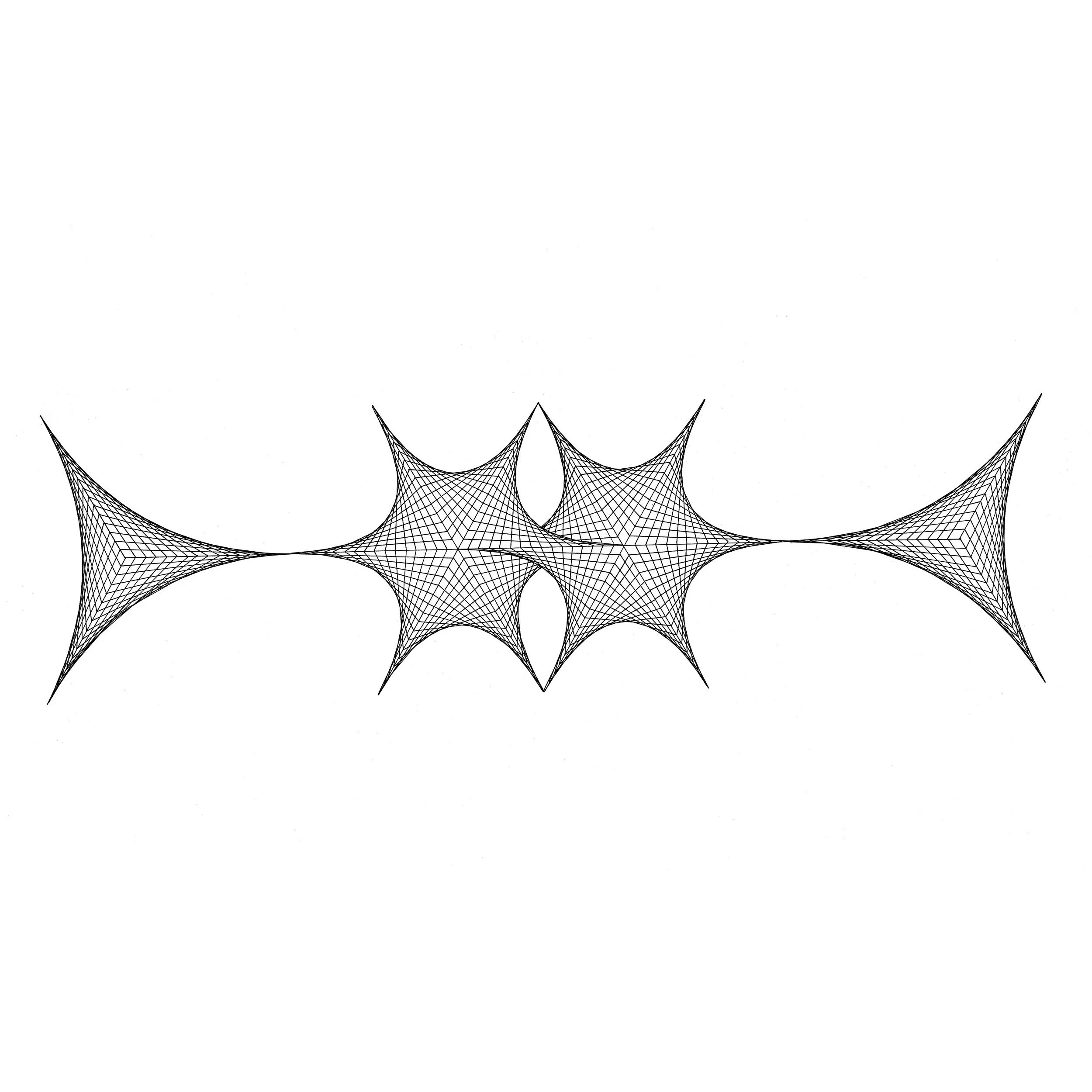
Human Error surfaced after Kitty was diagnosed with Complex PTSD and was required to take anti-psychotic medication.
The collection of drawings demonstrate permanent and varied expressions of the human urge to impose order and control over the chaos of past and current existence. As human beings we are inherently imperfect, yet we constantly seek perfection. We project ourselves outwards and inwards as we absorb information and influences around us. We shape, and are shaped by those influences in a constant process of evolution, response and development.
Algorithms, geometry and parabolic curves convey the tension and angst of human fallibility. These drawings look mechanically created but they are totally organic.
The search for unity and completeness, the striving for perfection, set against the imperfection of the human condition are the underlying themes of Human Error.
“Computers don’t feel emotion or make mistakes. The emotional drive and organic nature of the work allows me to reflect on the human condition and render each piece a personal journey”
Drawings that appear to be mechanically created
◈
but are totally organic
-

Ground Your Self
self /sɛlf/ noun
1. a person’s essential being that distinguishes them from others, especially considered as the object of introspection or reflexive actionSynonyms: ego, oneself, persona, identity, psyche, soul, spirit, mind, intellect
The Self in Jungian psychology signifies the unification of consciousness and unconsciousness in a person, and represents the psyche as a whole. According to Carl Jung the Self is realised as the product of individuation - the process of integrating one’s personality. It is symbolised by the circle (especially when divided in four quadrants), the square, or the mandala. Ground Your Self is an amplification of the Self symbol. It was inspired by ‘The Six Pillars of Self Esteem’ - a psychology book by Dr. Nathaniel Branden which highlights the key elements of a raised or lowered self-esteem in an individual. This piece accentuates the importance of healthy boundaries and grounding necessary whilst existing in, and surviving our dystopian digital age.
-

Bullseye
bullseye /ˈbʊlzʌɪ/ noun
1. a shot that hits the bullseye
Used to refer to a statement or act that achieves exactly the intended effect -
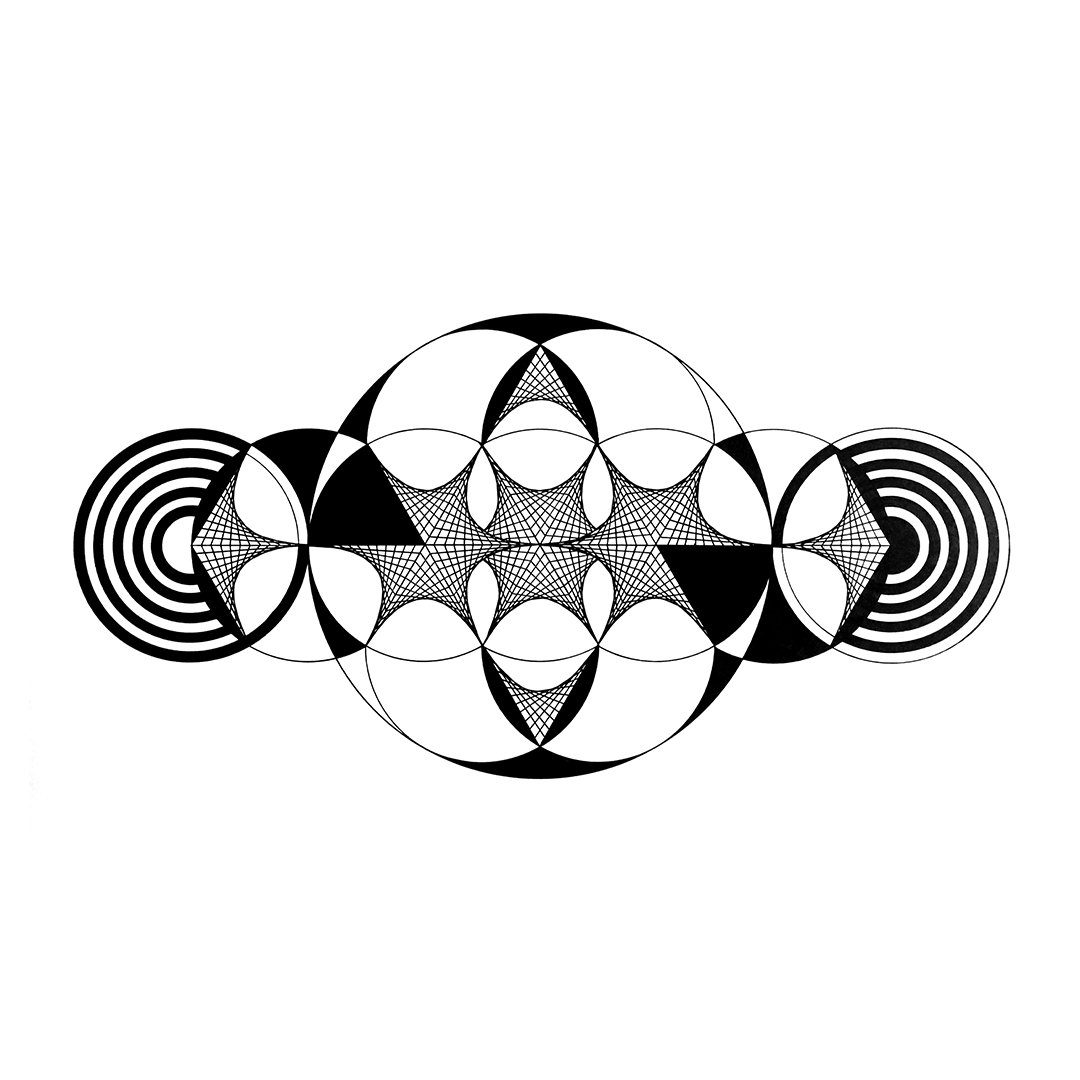
Confusion
confusion /kənˈfjuːʒ(ə)n/ noun
1. uncertainty about what is happening, intended, or required
2. the state of being bewildered or unclear in one’s mind about something
-
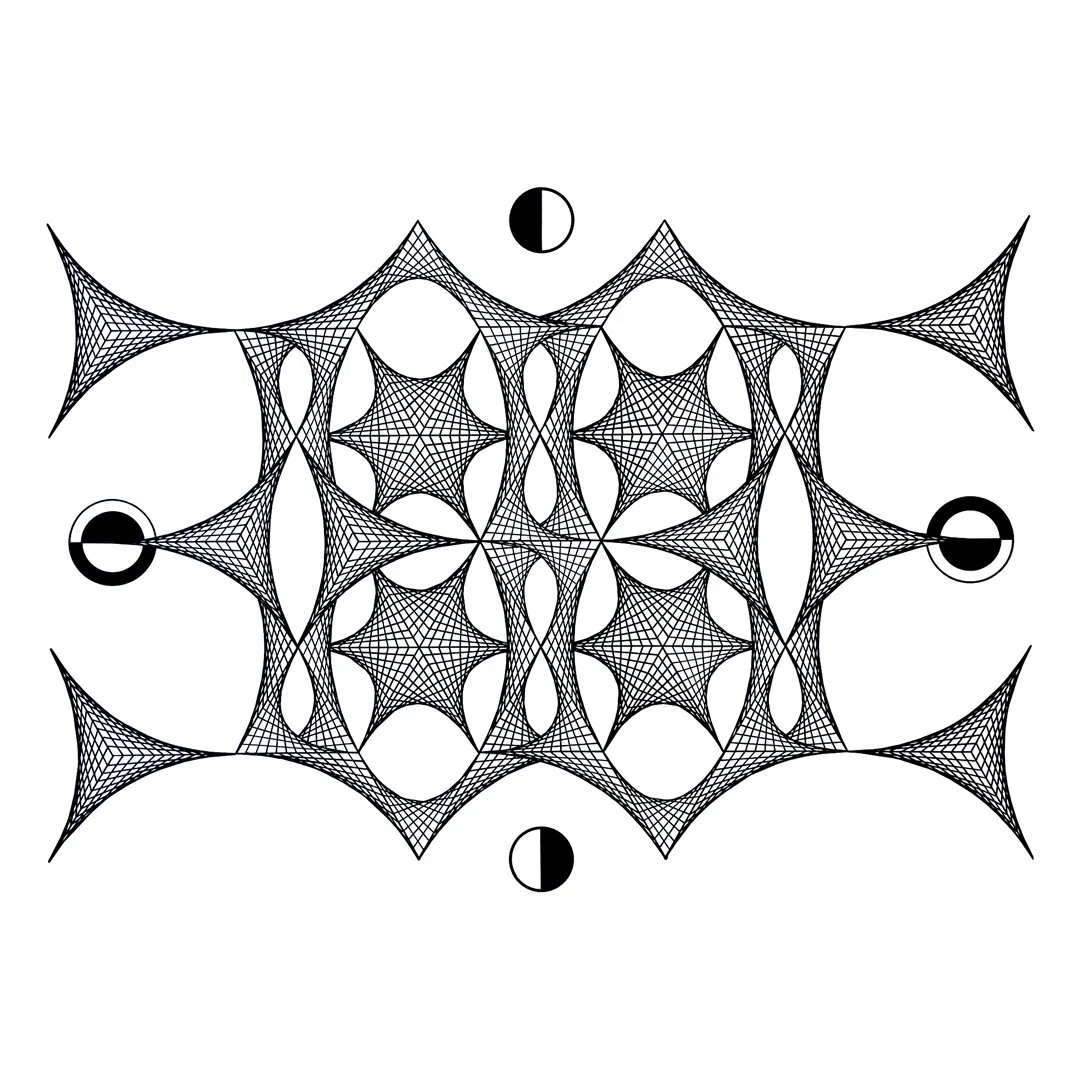
Entropía
Greek ἐντροπία - en-"within" trop-"change" entropy /ˈɛntrəpi/ noun
1. Physics - a thermodynamic quantity representing the unavailability of a system’s thermal energy for conversion into mechanical work “the second law of thermodynamics says that entropy always increases with time”. 2. lack of order or predictability; gradual decline into disorder. The degree of disorder or uncertainty in a system, which is proportional to the amount of energy no longer available to do physical work. The degradation of matter and energy in the universe towards death. It quantifies the exponential complexity of a dynamical system. Left unchecked disorder increases over time, as the entropy increases everything moves from order to disorder. Energy disperses, and systems dissolve into chaos. Entropy reflects that change.
-

Limpet
limpet /ˈlɪmpɪt/ noun
1. a marine mollusc which has a shallow conical shell and a broad muscular foot, found clinging tightly to rocks
Used in comparisons to refer to people and things that cling persistently.
-

Creation
creation /kriːˈeɪʃ(ə)n/ noun
1. the action or process of bringing something into existence.
2. the creating of the universe, especially when regarded as an act of God.
Based upon the Hexad, bringing perfection, structure and order. By the multiplication of two and three, even and odd, six is also the number of creation; with a cosmos made in six days being a common theme in scripture. The radius of a circle can be swung through its circumference in exactly six identical arcs to inscribe a regular hexagon; and six circles perfectly fit around one (Flower of Life) thus it is the first perfect number.
-
SeeSaw
see-saw /ˈsiːsɔː/ verb
1. change rapidly and repeatedly from one position, situation, or condition to another and back again
-
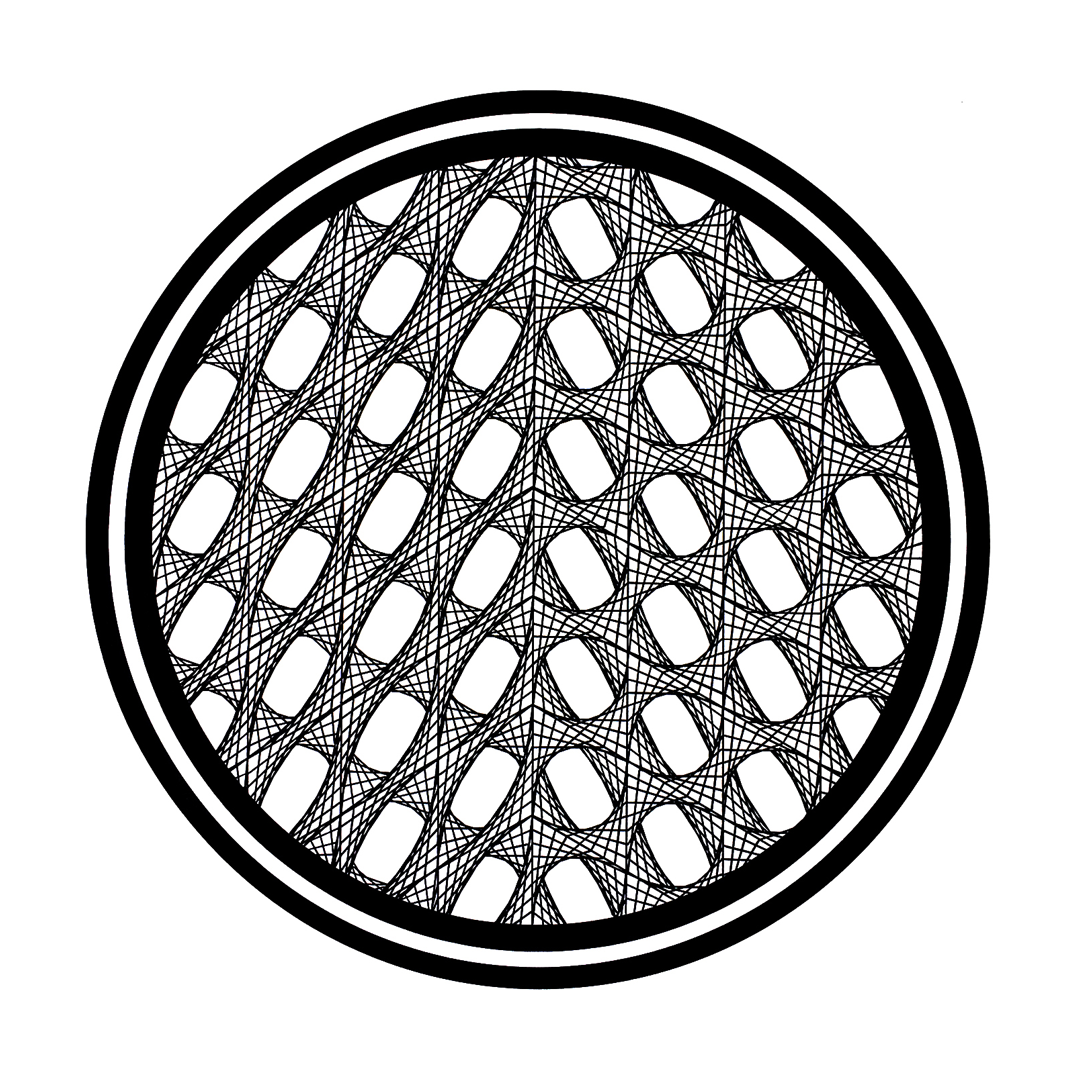
The Brain
brain /breɪn/ noun
1. an organ of soft nervous tissue contained in the skull of vertebrates, functioning as the coordinating centre of sensation and intellectual and nervous activity
Our brain is constantly working and feeding us information from each of the senses in order to make sense of the world around us. When suffering from a mental illness like C-PTSD the brain re-triggers painful thoughts or memories making it hard to differentiate between reality and fantasy. Metacognition is the process of stepping back from the thoughts to see them for what they are - a possible perspective. The thinking and observing brain are intimately interconnected, with metacognition it’s possible to consciously experience the world and then think about and reassess the experience. You cannot control the thoughts that appear in your mind, but you can control what you do once they appear, every action comes from a specific sequence of neural activity in the brain. Spending time observing the thoughts and sensations in our body helps to regenerate feelings of grounding, safety and our inner-self.
-

Equilibrium
equilibrium /ˌiːkwɪˈlɪbrɪəm,ˌɛkwɪˈlɪbrɪəm/ noun
A state in which opposing forces or influences are balanced. A state of physical balance
A calm state of mind
-

Nabla ∇
νάβλα
Del, or nabla, is an operator used in mathematics, particularly in vector calculus as a vector differential operator, usually represented by the nabla symbol ∇
-

Life
life /lʌɪf/ noun
1. the condition that distinguishes animals and plants from inorganic matter, including the capacity for growth, reproduction, functional activity, and continual change preceding death
2. the sequence of physical and mental experiences that make up the existence of an individual
The Flower of Life from New Age literature is a two-dimensional geometric pattern consisting of overlapping circles. It is one of the basic Sacred Geometry shapes, and is said to be evidence of intelligent design. It symbolises creation, demonstrates the interconnectedness of life on Earth and Universal existence, and reminds us of the unity of everything. We are all built from the same blueprint. The template for everything in existence and all geometric forms can be found within it.
-

The Root
root /ruːt/ noun
Muladhara /Sanskrit: मूलाधार/ “root support”
1. the basic cause, source, or origin of something
2. a number or quantity that when multiplied by itself, typically a specified number of times, gives a specified number or quantity
A parabolic imagination of the Root Chakra and its symbolic principles. Located at the base of the spine, the pelvic floor, and the first three vertebrae, the root chakra is responsible for your sense of safety and security on this earthly journey. The word Muladhara breaks down into two Sanskrit words: Mula meaning “root” and Adhara, which means “support” or “base”. The root chakra is comprised of whatever grounds you to stability in your life. This includes your basic needs such as food, water, shelter and safety, as well as your more emotional needs such as letting go of fear. When these needs are met, you feel grounded and safe, and you tend to worry less day to day.
-

Mass
mass /mas/ noun
1. Physics - the quantity of matter which a body contains, as measured by its acceleration under a given force or by the force exerted on it by a gravitational field
A fundamental property of all matter is the quantitative measure of inertia, the resistance that a body of matter offers to change its speed or position upon the application of force. According to the principle conservation of mass, the mass of an object or collection of objects never changes, no matter how the constituent parts rearrange themselves. The mass divides with the pieces so the sum of the masses of the individual pieces equals the original mass.
-

Life II
life /lʌɪf/ noun
1. the condition that distinguishes animals and plants from inorganic matter, including the capacity for growth, reproduction, functional activity, and continual change preceding death
2. the sequence of physical and mental experiences that make up the existence of an individual
-

Playback
playback /ˈpleɪbak/ noun
the reproduction of previously recorded sounds or moving images
Complex PTSD (c-PTSD) is a psychiatric disorder caused by severe, repetitive abuse over a long period of time. People with c-PTSD experience a variety of symptoms including flashbacks, nightmares, intrusive thoughts, anxiety, and avoidance. When triggered either internally or externally the brain interprets past traumatic events as current. Flashbacks are a disassociation symptom of c-PTSD, they are a vivid experience in which you relive aspects of the traumatic event as though it were happening again. Trauma is associated with lasting changes of key areas in the brain including the amygdala, hippo-campus, and pre-frontal cortex. It also releases the hormones cortisol and adrenaline - the body’s automatic way of preparing to respond to threat. Someone with PTSD will continue producing these hormones even when they are no longer presently in danger.
-
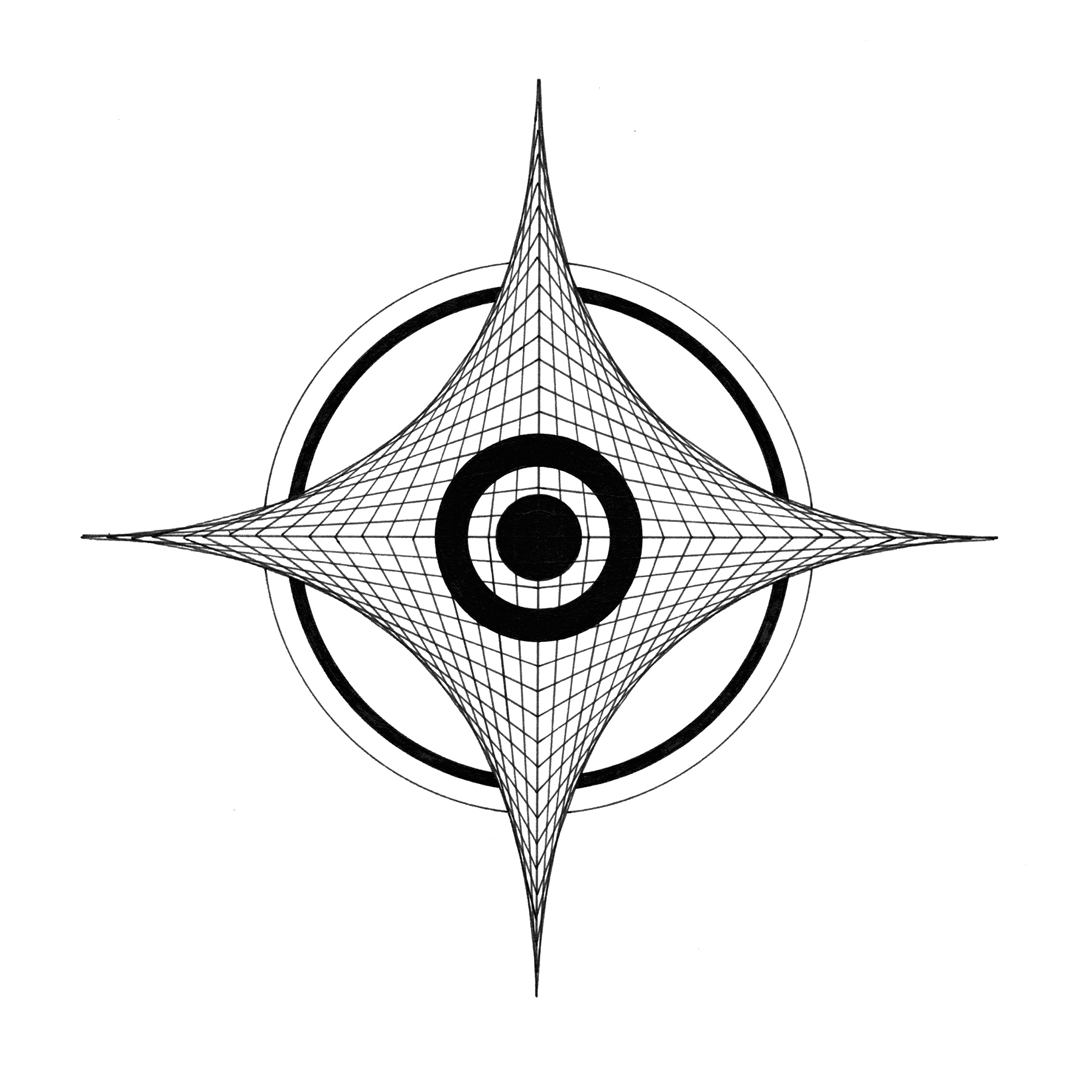
The Objective
objective /əbˈdʒɛktɪv/ noun
1. a thing aimed at or sought; a goal
synonyms:aim, intention, purpose, target, goal, intent.
The determination of the Self to reach higher levels of intellect and purpose manifested in the abstract accumulation of lines and circles. Influenced by Jungian psychology, signifying the unification of consciousness and unconsciousness in a person, and representing the psyche as a whole.
-
Suckerpunch
suckerpunch /ˈsʌkər pʌntʃ/ informal noun
1. a sudden surprise punch without warning and often without a provocation
2. an unexpected blow, defeat or setback
Also known as a coward punch, one hit punch, king hit or cold-cock, is a punch made without warning, allowing no time for preparation or defence on the part of the recipient. The term is generally used in situations when the punch delivered is considered unfair or unethical. In practice, this often includes punches delivered from behind.
Suckerpunches can take many forms. In a relationship suckerpunch the “sucker” receives a severe blow to his/her self-esteem, trust levels and maybe even sanity. The suckerpunch consists of sudden, inexplicable emotional or verbal abuse, delivered after weeks or months cultivating the trust of the other person.
-
Synchronicity
synchronicity /ˌsɪŋkrəˈnɪsɪti/ noun
1. the simultaneous occurrence of events which appear significantly related but have no discernible causal connection
Synchronicities are preprogrammed experiences that occur when one’s DNA is programmed for a specific event in time. Your soul sending you on a journey. Synchronicity is a concept first introduced by analytical psychologist Carl Jung, which holds that events are “meaningful coincidences” and describes the temporally coincident occurrences of a causal events. It was a principle that he felt encompassed his concept of the collective unconscious. Descriptive of a governing dynamic that underlies the whole of human experience and history, social, emotional, psychological, and spiritual.
-
Segregation
segregation /ˌsɛɡrɪˈɡeɪʃ(ə)n/ noun
1. the action or state of setting someone or something apart from others. Enforced separation of different racial groups in a country, community, or establishment
2. Genetics - the separation of pairs of alleles at meiosis and their independent transmission via separate gametes
-

Connect
connect /kəˈnɛkt/ verb
1. bring together or into contact so that a real or notional link is established
Our connections to our external and internal world, people, places, and things directly influence our state of being. Connection is core to the human psyche, and human connection is a powerful tool for building resilience. Relationships lie at the core of what it means to be human. Being with others, observing them, interacting with them, and building connections with them helps embed us in the real world.
-
Transference
transference /ˈtrɑːnzf(ə)r(ə)ns/ noun
The action of transferring something or the process of being transferred.
Psychoanalysis - the redirection to a substitute, usually a therapist, of emotions that were originally felt in childhood (in a phase of analysis called transference neurosis).
-
Trapped
trap /trap/ verb
past tense: trapped;
1. catch (an animal) in a trap
2. stuck in an unpleasant situation from which you are unable to move or escape, a lack of freedom
-
Radiation
radiation /reɪdɪˈeɪʃ(ə)n/ noun
1. Physics - the emission of energy as electromagnetic waves or as moving subatomic particles, especially high-energy particles which cause ionization
2. Biology - divergence out from a central point, in particular evolution from an ancestral animal or plant group into a variety of new form
-
Twin Flame
twin flame /twɪn/ /fleɪm/
our most perfect mirrors, because they are us in another body
Our twin flames are the only ones who give us a true and honest reflection of who we are, and where we are in our lives at any given time.



